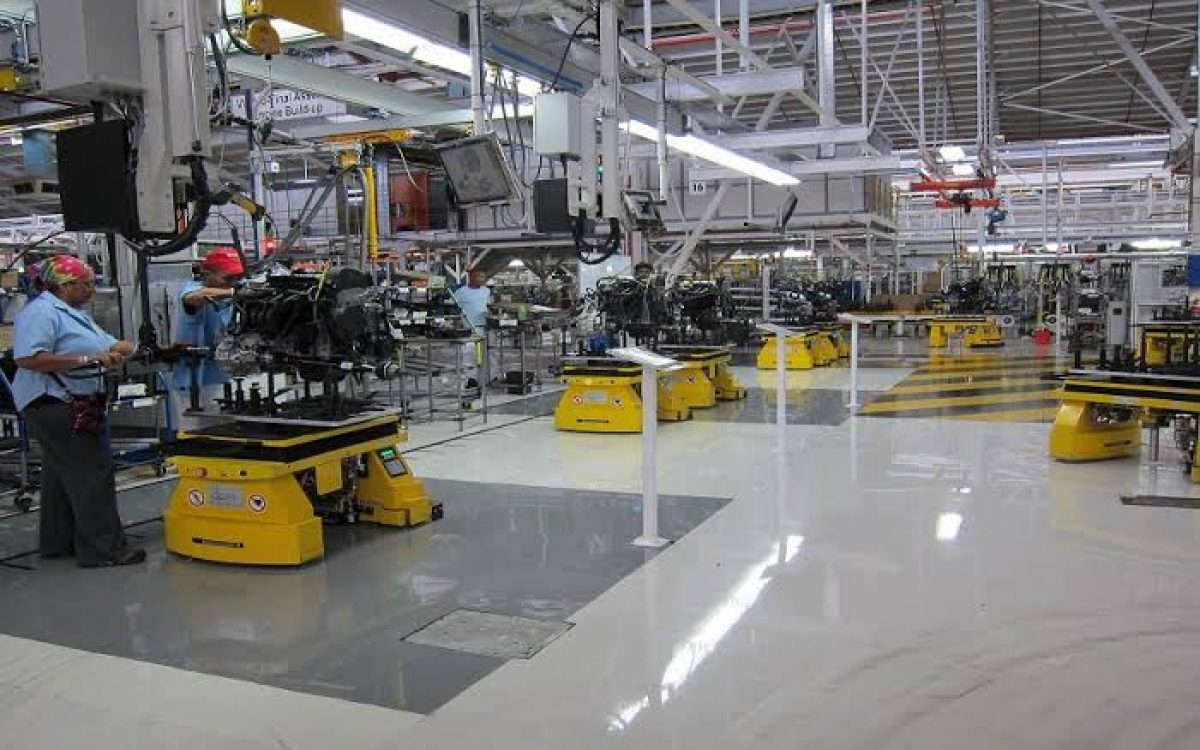Business News
Top 5 Investment Ideas in Nigeria
Top 5 Investment Ideas in Nigeria: Investments are essential if you want to increase your wealth and keep up with the rate of inflation…

Top 5 Investment Ideas in Nigeria: Investments are essential if you want to increase your wealth and keep up with the rate of inflation. Cash loses purchasing power over time as a result of inflation. Therefore, if you haven’t invested in a worthwhile instrument or Business, your monthly salary savings may be losing value every day.
Investing can be extremely lucrative. even if it’s really a tiny sum. You don’t need a sizable sum of money to start investing in Nigeria at the moment. You all have a wide range of ethical financial investment options in Nigeria to grow your wealth. Even though it’s only a few thousand Naira, your investment could increase over time if cumulative earnings increase.
Even if your income will be fixed if you work a full-time job, you won’t have enough free time to invest in the stock market. When selecting an investment tool, it is usually preferable if you can invest both time and money. There are a few investment products, nevertheless, that won’t require a lot of your effort for research and analysis if you’re pressed for time.
Understanding what you invest in and why is essential for effective investing. Doing thorough research is aided by knowing the peculiarities of the asset class you are investing in. You may decide what percentage of your capital goes into what and why by doing a thorough study on various asset classes.
READ MORE: 5 Investment Strategies To Double Your Money
Top 5 Investment Ideas in Nigeria
1. Agriculture

Top 5 Investment Ideas in Nigeria
There are 200 million people in Nigeria, according to estimates. Supporting such a fast-expanding population is therefore one of the most difficult issues. Nigeria is mostly dependent on imports because the population inhibits sufficient food production.
The government of Nigeria reportedly spent $24 billion annually on food imports, according to the minister of agriculture at the time. Governments have tried to restrict food imports ever since the nation gained its freedom. As a result, many advantages have in fact been given. The Bank for Agriculture was founded to help agricultural businesses get funding and support.
Agriculture-related businesses receive special financial support from a number of financial institutions, including the Nigerian Ministry of Finance, and government-initiated agricultural policies like AGRICULTURAL EXTENSION, TECHNOLOGY DEVELOPMENT AND TRANSFER POLICY, AGRICULTURAL CREDIT POLICY, AGRICULTURAL PRODUCT MARKETING POLICY, AGRICULTURAL RESEARCH POLICY, LAND RESOURCES POLICY, and AGRICULTURAL COMMODITY PROCESSING.
One of Nigeria’s most attractive investment opportunities has been in agriculture. Investments in agricultural production can be very successful if they are planned and managed appropriately. Crops, livestock, transportation, farm equipment, and a number of other issues are of major significance.
Top 5 Investment Ideas in Nigeria (how to invest in Agriculture)
According to Nigerian Investment Promotion Commission, The agricultural sector employs 48% of Nigeria’s workforce and generates 25% of the country’s GDP. Over the past five years, the sector has grown at an average rate of 4%. Along with cattle (1.7%), fisheries (0.5%), and forestry (0.3%), crop production leads the industry, accounting for 22.6% of GDP.
And the sector is open to private participation and investment opportunities abound across the various value chains. The broad categorization of these includes:
- Mechanized crop production such as rice, maize, millet, cassava, sugar cane, tomato, and the cash crops such as cocoa, palm kernel, and rubber, among others.
- Food processing and preservation across the value chains of the sector
- Beef processing and packaging
- Fruit juice/canned fruits
- Beverages and confectionary
- Cash crop processing – cocoa, palm kernel, rubber, among others
- The exploitation of timber and wood processing activities
- Livestock cultivation – dairy and aquaculture (fisheries) development
- Horticulture development.
- Agricultural input supplies and machinery.
- Water resources development especially for irrigation and flood control infrastructure.
- Commodity trading and transportation.
- Development and fabrication of appropriate small-scale mechanized technologies for on-farming processing and secondary processing of agricultural produce.
- Development of private irrigation facilities.
- Production of improved seeds and agrochemicals.
- Production of veterinary drug, vaccine, chemical, feeds, and feeds ingredients.
- Market Research
2. Manufacturing Industry

Top 5 Investment Ideas in Nigeria
Nigeria is a country that is excessively dependent on imports, even for the smallest of goods. Even for the largest economy in Africa, that is not acceptable enough. Regardless of how the economy is growing, there appears to be a higher need for domestic manufacturing of a variety of products.
There is labor available, cause, It will be profitable to invest in Nigeria’s economy to create jobs and promote growth in the economy. Governments have long pushed in favor of boosting manufacturing development.
In Nigeria, everyday necessities like toothpicks are very crucial. Just a few examples of essential items to manufacture are food, water (tables or sachets), fiber wires, telephone tools, car tyres, and even fabrics.
How to invest in Manufacturing sectors in Nigeria
Investors have been urged to direct their money toward the manufacturing sector, particularly the agro-processing, pharmaceutical, and renewable energy businesses. These sectors, according to experts, are lucrative niches that will provide investors with the needed returns.
According to Nairametrics, the suggestion was provided by the Nigerian Economic Summit Group (NESG) in its Sectoral Reforms and Investments in Nigeria Report.
Nigeria, namely its manufacturing sector, provides several favorable circumstances for investment, according to the group. Large arable land, a strategic location in Africa, a sizable market, and prospects provided by the AfCFTA are just a few of the requirements highlighted.
Regions of investment
The research identifies specific agricultural sectors to invest in, including the Wheat value chain, Maize value chain, Sorghum value chain, Poultry value chain, Pig value chain, Cassava value chain, Rice value chain, and Renewable energy value chain.
Pharmaceuticals and oil refining are also on the list since Nigeria offers tremendous investment opportunities in these industries.
3. Equities

Where To Invest Money In Nigeria
Stock trading may be a terrific way to develop or increase wealth. Investors with moderate to high-risk appetites engage in extensive trading in this asset. To get the intended outcome, the risk component of its price volatility must be managed carefully.
Equities are tested strategies for capital growth and dividend income (for dividend-paying shares). The ability to perform both fundamental and technical research is one of the best ways to invest in this sector. These evaluations aid in choosing which stock to purchase and when. Additionally, when to sell certain stocks.
Top 5 Investment Ideas in Nigeria (how to invest in Equities)
You need a stockbroker who will handle your trade on your behalf if you want to purchase shares that are listed on the Nigerian Exchange Group. Different brokers provide their clients with varying price structures, support, and financial advice.
-
Select a chosen brokerage after doing some research
A stockbroker is a designated agent with the power to carry out purchase or sell orders on behalf of investors. In terms of the Nigerian stock market, a broker-dealer business that is a dealing member of the NSE and is registered with the SEC is referred to as a stockbroker. Important things to think about when choosing a stockbroker are their accessibility, cost (because some companies require a minimum deposit to create an account), integrity/reputation, and status (active or inactive) with the NSE/SEC.
-
Sign up with the stockbroker of your choice
Customers must complete the broker’s registration form (either manually or online) and supply the KYC (know your customer) documentation listed below in order to register with a stockbroker.
• Identification documents (PVC, national identification card, driver’s license, or international passport);
• Evidence of a home address (bill or receipt no later than 3 months),
• A photograph and electronic signature from a passport (if filling out the form online).For non-Nigerian citizens, a notarized form of identification and proof of address would be needed.
-
Create a deposit and begin trading
Your stockbroker will give you the information for their bank account, and as soon as any payment you make is confirmed, they will fund your account. Your stockbroker completes all transactions with the exchange. One of two things may take place in this.
a. You can mail your broker trading instructions; this is the typical method.
b. Online trading platforms are offered by some brokers, enabling you to carry out trades on your own.
4. Fixed/Term Deposit Bank Accounts

Top 5 Investment Ideas in Nigeria
Another means where you can invest your money in Nigeria is through the bank Fixed deposit. This is a risk-free and secure way to invest money in Nigeria. If you have a sizeable sum of money that you won’t need for a long, you can invest it in a bank or other financial organization and make a good profit. This is heavily utilized by politicians.
The longer you fix your money, the larger the gain. Just inform the bank that you want to open a fixed deposit account. The process will be adhered to. As the money increases, just go home, relax, and keep on with your usual activities.
How to invest in Term Bank Deposit in Nigeria
What exactly are fixed deposits then? A considerable sum of money placed in a bank for a certain period of time in exchange for interest that accrues after the initial investment is known as a fixed deposit. See below how to invest in one.
- Need to have a current account with the bank.
- There is a minimum amount required for the investment – typically about N100,000.
- It’s usually a 30-day minimum investment requirement.
- The investment can be withdrawn or terminated at any time.
- If the investment is withdrawn before the maturity date, only the interest accrued within the timeframe of the investment will be paid out.
- Interest is subjected to WHT (Withholding Tax) at the time of withdrawal.
Similar to opening a regular savings account, opening a fixed-income bank account has a term period before which the deposit cannot be canceled or a portion of the interest would be forfeited. Prior to opening a fixed- or tenured-deposit account, investors must carefully review the time frame, interest rate, and all other terms.
5. Fintech

Top 5 Investment Ideas in Nigeria
African fintech raised up to $1.4 billion between January and September 2021, indicating an increase in investor interest in the continent’s expanding fintech market, with Nigeria taking the lead. Paystack and Flutterwave’s 2016 launch revolutionized Nigeria’s financial industry by making it possible for thousands of other companies to be paid for their goods and services.
Since then, every year has seen an intriguing trend as individuals try to close various alleged gaps in Nigeria’s financial industry. Data provided by Techpoint indicates that in 2021, Nigerian financial companies raised close to $800 million. This was 120% more than what fintech together raised over the previous three years ($360.7 million).
Top 5 Investment Ideas in Nigeria (how to invest in Fintech)
In emerging markets, fintech adoption is happening more quickly. The number of platforms is exploding, and investment activity is rising. In an effort to keep up with the market’s quick expansion, several governments and authorities from numerous jurisdictions are striving to establish sufficient fintech ecosystems.
Here are some pointers for selecting the best Nigerian fintech startups to invest in:
-
Make a personal evaluation
You must conduct a personal assessment before investing. This entails making sure you are prepared financially to invest in the startup and are aware of the risk. Additionally, you should have the necessary funds on hand and understand how much of your portfolio has to be set aside for this purpose.
-
Select the best Fintech businesses to invest with
Which of Nigeria’s numerous Fintech businesses should investors invest in? Make sure the startup has a clear business strategy and answers an issue before taking any action. If not, it is recommended to stay away from investing in them.
Before making an investment in a Fintech firm, you need also take the following into account:
– The good or service being supplied must be distinct from others.
– Does it address a current issue? If so, it is worthwhile to invest in!
-
Don’t under- or over-invest, invest the right amount
Contrary to mutual funds or equities, where you may purchase as much as you like and still expect to make money, investing in a fintech startup is riskier. When you invest in startups, you should only put down the amount you can afford to lose. This means that if the business fails, your losses will be strictly restricted to the money you invested.
It’s also a good idea to spread out your financial investments in companies. Spread out your investments by making little investments with several businesses at various periods until they become huge successes and offer great returns on their investments rather than placing all of your eggs in one basket and maybe losing everything.
SUMMARY
Here is a summary list of the Top 5 Investment Ideas in Nigeria
- Agriculture
- Manufacturing Industry
- Equities
- Fixed/Term Deposit Bank Accounts
- Fintech
